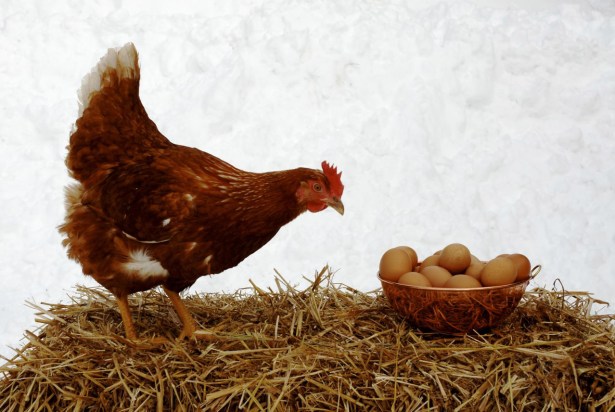Maine ‘Forever Chemicals’ Problem Has Now Spread to Chicken Eggs
By Julia Bayly | Bangor News | December 13, 2021

Read the full article by Julia Bayly (Bangor News)
“Last month the state issued a “do not eat” advisory for deer meat harvested in and around Fairfield due to unsafe levels of so-called forever chemicals found in the animals. Now testing data has shown levels of those chemicals in some chicken eggs from the same area.
The eggs that were tested, according to Dr. Andrew Smith, state toxicologist with the Maine Center for Disease Control and Prevention, were from two Fairfield homesteads and households that had already tested positive for high levels of the toxic per- and polyfluoroalkyl substances — or PFAS — in their water.
The new state standard for water, according to Smith, is 20 parts per trillion, which the homeowners achieved after treating their water.
Used in everything from non-stick pans to waterproof clothing, PFAS have been linked to a number of chronic illnesses in people, including cancer. Here in Maine, the chemicals are increasingly showing up in the food people grow, raise and hunt after sludge was spread on farm fields.
In Fairfield, some families were concerned specifically about their eggs.
‘Maine CDC was asked whether eggs from their chickens [that were] provided high PFAS well water were safe to eat,’ Smith said. ‘We also tested whether after the water was treated, would they be safe to eat.’
Turns out, when it comes to eggs, ‘forever chemicals’ are not forever.
The eggs were first tested at the end of 2020. At the time, toxicity levels in the eggs and in the water provided to the chickens were high in one of the two homes.
A second round of testing in March after the chickens had been switched over to treated, PFAS-free water, showed a significant drop in the eggs’ PFAS levels.
All of the chemicals, Smith said, were found in the yolks of the eggs. That made sense, as a German study of PFAS chemicals in chickens showed that most of the toxins were found in the chickens’ plasma. Plasma plays a major role in yolk development.
In addition, it was found that PFAS in eggs has a very short half life.
Chemists use the term ‘half life’ to measure how long it takes for a chemical to drop to half its original concentration.
When it came to the eggs, the half life of some of those forever chemicals could be measured in days, Smith said. His team discovered that once the chickens were taken off PFAS contaminated water, there was no evidence of any chemicals in the eggs after about 10 days.
However, Smith said that further testing showed there are still plenty of PFAS toxins available to the chickens.
‘We went back in June to test the eggs again and got a surprise,’ Smith said. ‘We knew the chickens were back out free ranging and wondered if the soils were a pathway for the PFAS to the chickens.’
The testing showed that it was.”…
This content provided by the PFAS Project.
Location:
Topics: